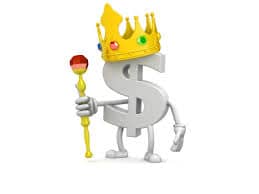All treasurers and most financials know the statement “cash is king”. I do not have to explain the meaning; it is best for a company to have cash above any other forms of (accounting) income. Not talking about the problems of not having any cash. Having cash makes a company stronger and opens possibilities to use this cash (dividends, M&A), and cash is also needed to pay the bills.
However, for several years we are living in a world where interest rates are negative. So it costs money to own cash. It is suddenly costly to be a bigger king. This has some implications for companies and treasuries.
ACTIVE CASH MANAGEMENT
Because it is expensive to have and hold cash it is important for treasurers to know where all the cash is and what the position is. Only holding the cash and doing nothing means that the cash balance will decrease because of negative interest. It therefore makes sense to look into options to reduce the cash level. This does not necessarily mean spending the money!
Several options include:
- Compensating negative cash balances with positive cash balances, also between different currencies (fx swaps)
- Repaying loans
- Paying dividends
- Paying suppliers earlier to receive a discount
Of course above options are examples and depend on the specific company. The most important aspect of doing the above actions are the cash flow forecast. The actions you are taking now have an impact on your future cash position so if some actions are good for now they should also be beneficial in the future situation. Simulations and forecasting software can help with this. For example, a simulation on your credit lines, changing interest rates, and changing payment terms can be very interesting.
FLOORS AND TERM
If you are with your bank for a long time there is probably nothing agreed about negative interest rates on your cash as this was not foreseen by banks 10 years ago. This gives you an opportunity to negotiate with the bank on your term for having cash.
Some possibilities I have seen with my clients:
- Floors in the interest rates. This does not necessarily have to be 0% floor
- Thresholds: for example the first 10 mln no negative interest charge
- Combinations of both from the above points
- Spread between credit and debit amounts; a lower spread is often better
INVEST
Another option to reduce the interest charge on your cash is to invest the money. This is a sensitive topic as most treasurers are risk-averse. The more return is expected the higher the risk associated with the investment. Cash at a bank is considered fairly safe (given the cash is divided over several banks with a good credit rating and depending on the amounts). Furthermore, the liquidity of the investment is important. Cash is readily available. If you invest the money it first has to be exchanged or transferred to cash which can take the time or can have an impact on the return. Most treasurers are prudent on investments and/or internal rules do not allow these.
CONCLUSION – CASH IS STILL KING?
Overall, looking at the above cash is still king. For every company, it is better to have cash than to be short on cash. However, having too much cash can hurt a company too as the return on cash balances is very low and in most cases negative. In these times the value of a treasurer looking at the cash balances and optimizing its uses (and return) is big. So does your company not have a dedicated person looking at the (excess) cash and the optimization of the cash now and in the future (cash forecasting) then it might be time to assign somebody to this task. In most cases the return on this person is positive (even though the interest rate is negative).
An external treasurer or flex treasurer can be of help too.

